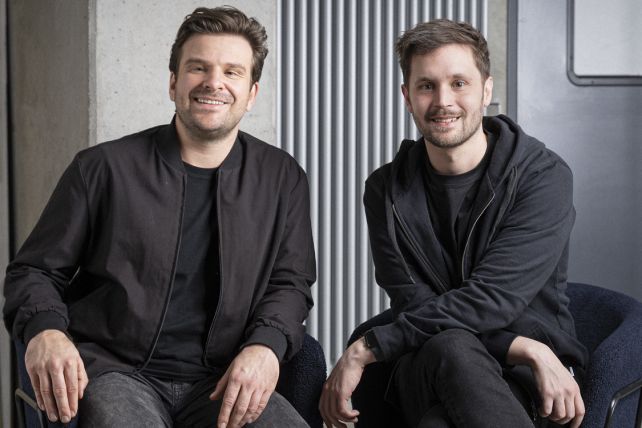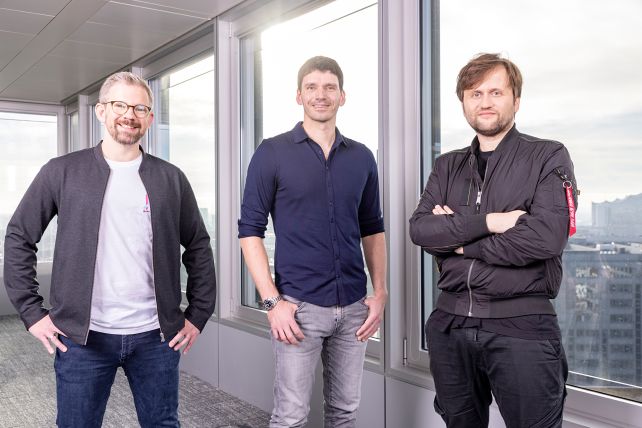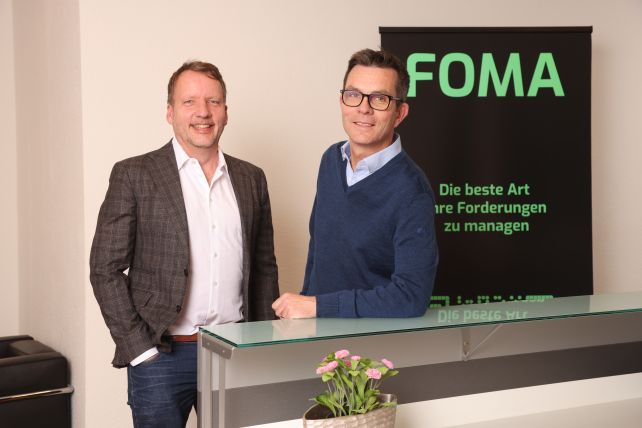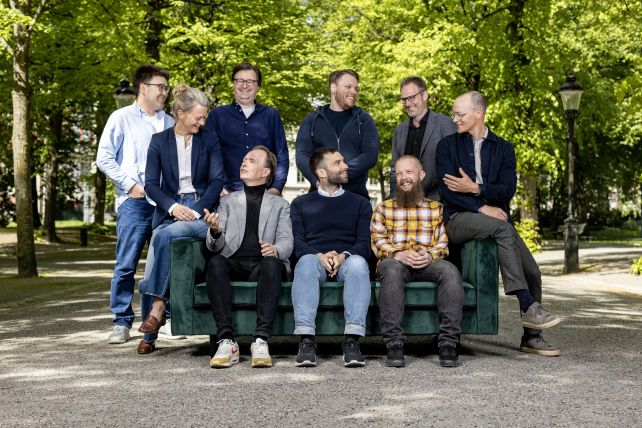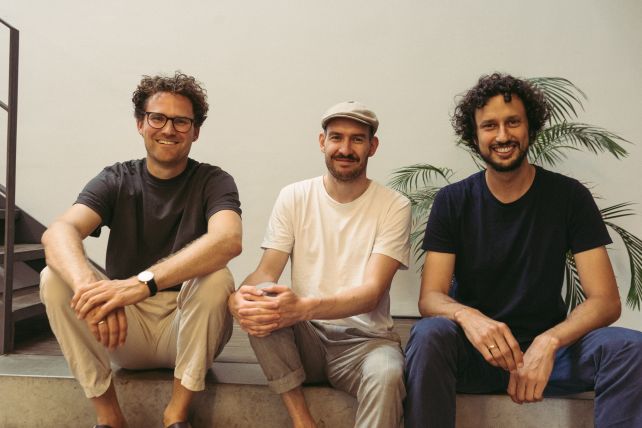Leasing instead of buying - it's already common practice in many sectors. Why shouldn't this also work for catering and office equipment, thought three friends, and founded Flexvelop in 2018. Their success proved them right; the startup has just moved its headquarters to the noble Elbchaussee and is about to announce its first major round of financing.
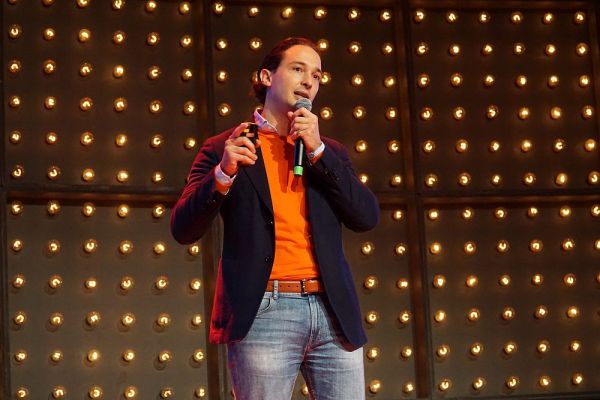
The idea comes from Australia
It all started in the navy. For twelve years, Dr. Hans-Christian Stockfisch, Hans-Christian Mergel and Dr. Ephraim Robbe had committed themselves there. During this time, the trio's desire to found a startup together after completing their service in the German Armed Forces matured. They still lacked the right idea, but Hans-Christian Stockfisch came up with it when he was temporarily working for an investment company.
In the process, he learned about an Australian company that made its sales with a special form of leasing. When most people hear the term "leasing," they probably first think of road vehicles for commercial or private use. In fact, this is where the industry makes its biggest sales by far, but larger production machinery is also an important business area. The Australians, on the other hand, had focused on smaller equipment that is normally only available for purchase.
After his time in the navy, Hans-Christian Mergel had first become involved in a pizza delivery service. Therefore, he knew one of the fundamental problems of the catering industry. Sales there often fluctuate and are difficult to calculate, and a lot of times margins are low. The acquisition of professional kitchen equipment can become a real challenge if the purchase price exceeds the current liquidity and a bank loan is not an option. So leasing could be the solution here.
It was on this premise that the three ex-soldiers founded Flexvelop in 2018. The initial focus of the young company is already clear from the original company logo. The "x" was formed by a crossed knife and fork. The name itself is made up of the term "Flexible Development", which contains the promise to provide customers with flexibility in the development of their business. This also gave rise to the fancy verb "flexen", which describes the form of leasing developed by Flexvelop.

Corona caused a change of course at Flexvelop
As a startup, Flexvelop placed great emphasis from the outset on making the leasing process as uncomplicated and digital as possible. It found the ideal partner for this in Sebastian Deutsch, who still serves as CTO today. Above all, Sebastian is the founder of the Bochum-based software company 9elements, which has been in existence since 1999 and works for numerous well-known companies. This is why Flexvelop's IT team is based in the Ruhr region. Thanks to the know-how and also the financial security provided by 9elements, the Hamburg-based startup could be sure of being able to offer a technically flawless solution.
However, its development took time, and the software was not ready for the market until the end of 2019. What happened a few months later is common knowledge and had a direct impact on the business model. The Corona pandemic hit the catering industry particularly hard, with many establishments having to limit themselves to out-of-home business or at least temporarily close down completely. So for Flexvelop, customers were in danger of being lost before they could even be reached. Fortunately, emergency aid from the federal government and Hamburg's IFB development bank gave the young company the breathing room it needed to redefine its clientele.

New business focus: office equipment
In mid-2020, Hans-Christian Mergel, one of the original founders, left the company. Together with the other Hans-Christian, he had still been running a real estate development company and now wanted to focus entirely on this project - with great success. But things were also moving forward at Flexvelop after they had concentrated on equipping offices. Marvin Nelle, Head of Sales and a member of the team since 2018, was able to win online retailer Notebooksbilliger.de as the first major partner, followed by Expert's consumer electronics stores.
Strong partners are essential for the business model, because it is through them that potential customers learn about Flexvelop's offerings. Let's play through this with a simple example. A company is planning to buy five new laptops for its employees, but can't bring itself to make a purchase at the moment. The retailer then proposes "Flexvelop" as an alternative. If the proposal is accepted, Flexevelop buys the devices and passes them on to the customer. The customer then pays a weekly fee, and insurance is automatically included at no extra charge.
After six months, customers can decide whether they want to take over the equipment permanently at a residual purchase price, which of course decreases the longer the leasing phase lasts. After twelve months, the equipment can be returned or the lease can be extended on a weekly basis. Experience shows that the majority of customers take over the equipment, a fact that makes it easier for banks and flexvelop investors to make their financial commitment.

Flexvelop is guided by the principle of the honorable merchant
2021, the startup was therefore able to close its seed financing round in the amount of 800,000 euros. It used the money to further expand its offering and customer base. In the meantime, there is hardly a device with a purchase price of between 300 and 20,000 euros that cannot be purchased via Flexvelop. The customer base is similarly diverse. Many smaller companies and also freelancers are among them, but so is one of the largest management consultancies in the world. Whether large or small, Flexvelop treats them all according to the Hanseatic principle of the honorable merchant.
Nevertheless, there was a brief discussion in the fall about moving the company's focus from Hamburg to North Rhine-Westphalia because financing that had already been firmly planned did not materialize. However, funding from the InnoFinTech program of IFB Innovationsstarter GmbH closed the monetary gap in the fall. In the meantime, it looks as if the announcement of the next round of financing is imminent.
In 2023, Flexvelop is more anchored to the Hamburg location than ever before. Until recently, it used HK100, the coworking space of logistics insurer KRAVAG, as its office. It has just moved to the noble Elbchaussee, one of the finest addresses in Hamburg. This impresses even rather conservative business partners from the financial sector. The costs for a startup are affordable, as the company is a subtenant of the long-established Vega shipping company. Hans-Christian had made contact with Vega during his time in the navy, which is now paying off. Flexvelop is just Hanseatic through and through.



